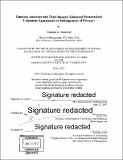| dc.contributor.advisor | Sinan Aral. | en_US |
| dc.contributor.author | Le Menestrel, Penelope | en_US |
| dc.contributor.other | Sloan School of Management. | en_US |
| dc.date.accessioned | 2017-09-15T15:35:02Z | |
| dc.date.available | 2017-09-15T15:35:02Z | |
| dc.date.copyright | 2017 | en_US |
| dc.date.issued | 2017 | en_US |
| dc.identifier.uri | http://hdl.handle.net/1721.1/111457 | |
| dc.description | Thesis: S.M. in Management Studies, Massachusetts Institute of Technology, Sloan School of Management, 2017. | en_US |
| dc.description | Page 85 blank. Cataloged from PDF version of thesis. | en_US |
| dc.description | Includes bibliographical references (pages 79-84). | en_US |
| dc.description.abstract | The consumer landscape has changed: the balance between supply and demand has shifted, with consumers facing a variety of products and services that are hard to tell apart, resulting in poor brand loyalty, and customers are now overwhelmed with a flood of constant information, leading to reduced attention spans that brands have to fight for. Brands have to be innovative and more efficient in the way they interact with consumers. Brands also have to make their way through the increasing amount of data collected, and focus only on value-adding data. Furthermore, in our society where speed now prevails, emotions have become the principal driver of people's decisions. Hence the opportunity provided by emotion analytics, which enable companies to analyze customers' cognitive behavior and emotional responses towards their brand, and to adequately enhance their customer experience to gain competitive edge. The study includes a detailed overview of why brands should focus their investment in analyzing customer emotions, as well as a description of how emotions work, and thus how they can be measured through several different but complementary technologies. The study also includes interviews of players in the industry, and an overview of current and potential future applications of emotion analytics for brands looking to improve their customer experience. Last, we will investigate how people perceive emotion technologies and their impact, how ethical and legal issues can be tackled, and what can be expected regarding the future of emotion economics. | en_US |
| dc.description.statementofresponsibility | by Penelope Le Menestrel. | en_US |
| dc.format.extent | 85 pages | en_US |
| dc.language.iso | eng | en_US |
| dc.publisher | Massachusetts Institute of Technology | en_US |
| dc.rights | MIT theses are protected by copyright. They may be viewed, downloaded, or printed from this source but further reproduction or distribution in any format is prohibited without written permission. | en_US |
| dc.rights.uri | http://dspace.mit.edu/handle/1721.1/7582 | en_US |
| dc.subject | Sloan School of Management. | en_US |
| dc.title | Emotion analytics and their impact : enhanced personalized consumer experiences or infringement of privacy? | en_US |
| dc.title.alternative | Enhanced personalized consumer experiences or infringement of privacy? | en_US |
| dc.type | Thesis | en_US |
| dc.description.degree | S.M. in Management Studies | en_US |
| dc.contributor.department | Sloan School of Management | |
| dc.identifier.oclc | 1003321625 | en_US |
